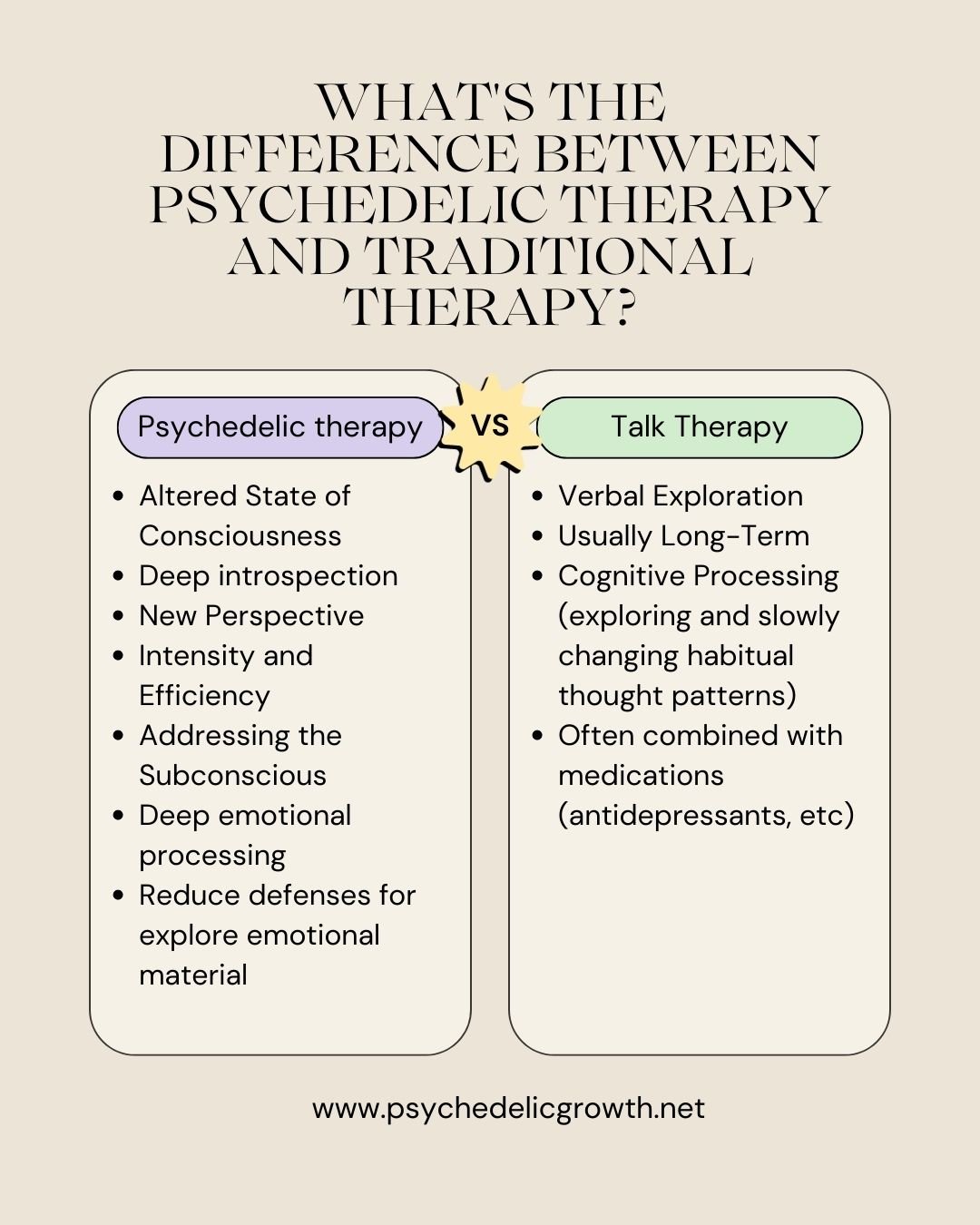How is Psychedelic Therapy Different from Traditional Therapy?
In recent years, there has been a growing interest in alternative approaches to mental health treatment, and one of the most intriguing developments is the use of psychedelic therapy. This unconventional method is gaining attention for its potential to revolutionize the way we address mental health challenges. In this article, we will explore the concept of psychedelic therapy, specifically focusing on ketamine-assisted psychotherapy, the evidence supporting this approach, and the key differences between psychedelic therapy and traditional talk therapy as well as medication-based treatments.
What is Psychedelic Therapy?
Psychedelic therapy is a unique approach to treating mental health disorders that involves the controlled use of psychedelic substances under the guidance of trained therapists. These substances, such as psilocybin (found in magic mushrooms) and MDMA (commonly known as ecstasy), have long been associated with altered states of consciousness. In a therapeutic context, they are administered in a controlled environment to induce a state of heightened introspection and self-awareness. The aim is to help patients confront and process deep-seated emotions, traumas, and negative thought patterns.
What is Ketamine-Assisted Psychotherapy?
One of the most studied forms of psychedelic therapy is ketamine-assisted psychotherapy. Ketamine is a dissociative anesthetic that, when administered at sub-anesthetic doses, can induce altered states of consciousness. In this therapy, patients are given a controlled dose of ketamine, and while under its effects, they engage in therapy sessions with trained mental health professionals. This altered state is believed to create a unique opportunity for patients to explore their thoughts and emotions from a different perspective.
The Evidence for Psychedelic Therapy
Research into the effectiveness of psychedelic therapy, including ketamine-assisted psychotherapy, has yielded promising results. Studies have shown that these therapies can be particularly effective in treating conditions such as depression, post-traumatic stress disorder (PTSD), and anxiety. For example, clinical trials have demonstrated that a single session of psilocybin-assisted therapy can lead to significant reductions in depressive symptoms that last for several weeks or even months.
How is Psychedelic Therapy Different from Talk Therapy?
While both psychedelic therapy and traditional talk therapy aim to improve mental health, they differ in their approaches and mechanisms. Here are some key distinctions:
Psychedelic Therapy:
Altered States of Consciousness: Psychedelic therapy relies on inducing altered states of consciousness through the controlled use of substances. This altered state can lead to deep introspection and a unique perspective on one's emotions and experiences.
Intensity and Efficiency: Psychedelic therapy often produces rapid and intense therapeutic experiences. A single session can sometimes achieve results that might take multiple traditional therapy sessions to achieve.
Addressing the Subconscious: Psychedelic therapy has the potential to access and address the subconscious mind more directly, allowing patients to confront and process deeply rooted emotional issues.
Talk Therapy:
Verbal Exploration: Traditional talk therapy involves verbal communication between the patient and therapist. The therapist helps the patient explore their thoughts, emotions, and experiences through conversation.
Long-Term Process: Talk therapy is often a gradual and ongoing process, with patients attending multiple sessions over an extended period to achieve therapeutic outcomes.
Cognitive Processing: Talk therapy primarily focuses on cognitive processing and insight. It helps patients understand their thought patterns, behaviors, and emotions, leading to healthier coping strategies.
How is Psychedelic Therapy Different from Medications Like Antidepressants?
Psychedelic therapy differs from medication-based treatments in several significant ways:
Psychedelic Therapy:
Limited Dosage: Psychedelic therapy typically involves only a few sessions, sometimes even a single session, as the focus is on achieving therapeutic breakthroughs rather than long-term medication use.
Psychological Processing: The effects of psychedelics are believed to work through psychological processing, allowing patients to confront and process their emotions, traumas, and negative patterns of thinking.
Altered Perspective: The altered state of consciousness induced by psychedelics can provide patients with new insights and perspectives on their lives, fostering personal growth and change.
Medication-Based Treatments:
Continuous Usage: Medications like antidepressants are often taken daily over an extended period. They work by regulating brain chemistry and aim to provide ongoing relief from symptoms.
Symptom Management: Medications primarily target the alleviation of symptoms by influencing neurotransmitter levels in the brain. They do not necessarily address underlying emotional or psychological issues.
Less Intensive Insight: Unlike psychedelic therapy, medication-based treatments do not provide the same intense introspection and profound shifts in perspective that can occur during altered states.
In conclusion, psychedelic therapy, with a focus on approaches like ketamine-assisted psychotherapy, offers a new and exciting way to tackle mental health challenges. Its emphasis on inducing altered states of consciousness, rapid results, and direct confrontation of subconscious issues distinguishes it from traditional talk therapy and medication-based treatments. While still in its early stages, the growing body of evidence suggests that psychedelic therapy has the potential to reshape the landscape of mental health treatment, offering a unique avenue for those seeking profound transformation and healing.

